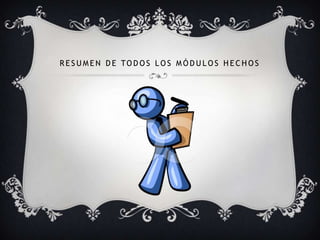RESUME PPT
- 1. R E S U M E N D E TO D O S L O S M ? D U L O S H E C H O S
- 2. S I M P L E PA S T REGULAR AND IRREGULAR VERBS
- 3. D E F I N I T I O N : U S E T H E S I M P L E PA S T T E N S E T O T E L L A B O U T S O M E T H I N G T H AT H A P P E N E D B E F O R E N O W. REGULAR VERBS IRREGULAR VERBS Simple form Past tense Simple form Past tense pull pulled are were listen listened am, is was use used go went change changed do, does did play played see saw
- 4. H E B O U G H T A P R E S E N T.
- 5. H E C L I M B E D A M O U N TA I N .
- 6. H E P L AY E D T H E G U I TA R B U T H E D I D N ¡¯ T P L AY THE PIANO.
- 8. Definition: We use the reflexive pronouns to indicate that the person who does the action of the verb is the same person who receives the action. Example 1: I cut my hair myself. * In this example "I" does the action of cutting the hair and at the same time "I" gets the action of the hair being cut. Example 2: We defended ourselves brilliantly. * In this example the reflexive pronoun "ourselves" refers back to the subject of the sentence. Example 3: John talks to himself when he is nervous. * In this example "Himself" refers to John
- 9. Exercises Choose the correct reflexive pronouns from the dropdown menu. 1) Robert made this T-shirt _______________ 2) Lisa did the homework ________________ 3) We really enjoyed______________ very much. 4) Emma, did you take the photo all by____________ ? 5) I wrote this poem_____________ . 6) He cut with the knife ___________while he was doing the dishes. 7) The lion can defend_______________ . 8) My mother often talks to_________________ . 9) Tim and Gerry, if you want more milk, help_____________ . 10) At Christmas friends often give _______________presents.
- 10. PRESENT PERFECT SIMPLE CASES AND FORMS
- 11. PRESENT PERFECT TENSE FORM: have / has + past participle Affirmative: I have seen the film before. She has seen the film before. Interrogative: Have you seen the film before? Has she seen the film before? Negative: They haven¡¯t seen the film before. He hasn¡¯t seen the film before.
- 12. USES OF THE PRESENT PERFECT 1- Recent events: It is used to describe recent events without a definite time. We use just in positive sentences to say that something happened very recently. Why are they so happy? They have just won a prize so they are really pleased.
- 13. USES OF THE PRESENT PERFECT 2- Personal experiences: It is used to express personal experiences, there is not a definite time given. The time expressions ever and never are very often used with this meaning Have you ever been to Japan? No, I¡¯ve never been there.
- 14. USES OF THE PRESENT PERFECT 3- It is used to express actions which started in the past and are still continuing in the present, the time period is not finished. I have lost my keys. (And I haven¡¯t found them yet.)
- 15. WE OFTEN USE THE PRESENT PERFECT TENSE WITH ALREADY AND YET Already: Something happened before now or earlier than expected You can use already in positive sentences. Put already before the main verb. Yet: Until now. You can use yet in negative sentences and questions. Yet is usually at the end. Example: A) Have you done your homework yet? B) No, I haven¡¯t done it yet. / Yes, I¡¯ve already done it.
- 16. THE END















